Picture this: You're strolling down a charming Parisian street, croissant in hand, when you bump into a local. Your heart races as you prepare to utter those magical words: "Comment allez-vous?" But wait! Are you using the right form? Should you greet them in a more informal and casual way? And oh mon Dieu, what if they actually tell you how they're feeling? Fear not, mes amis! We're about to embark on a linguistic adventure that'll take you from awkward tourist desiring to speak French to suave conversationalist faster than you can say "Ça va?"
We'll explore everything from formal phrases that'll impress your boss to slang that'll have your French friends thinking you've been secretly a Parisian all along. You'll learn:
-
The crucial difference between "tu" and "vous" (get this wrong, and you might accidentally insult your new French grandmother)
-
How to navigate the minefield of formal vs. informal greetings
-
Why a simple informal "ça va" can mean a dozen different things (context is key, people!)
-
Regional variations that'll make you sound like a local, whether you're in Nice or Normandy
-
The art of the French response – because "I'm fine" just doesn't cut it in the land of Molière
When is "How are you" used in French and how its usage depends on context and scenario
First things first: in French, asking how someone is doing is a big deal. It's not just a throwaway phrase like it sometimes is in English.
When a French person asks "Comment allez-vous?" or "Comment vas-tu? they're genuinely interested in your response. So get ready to give a bit more than just an "I'm fine, thanks!"
"Vous" is a very polite way to address someone you do not know. It can also be used when talking to more than one person. On the other hand, "Tu" is used in more casual ways with people you know.
Now, let's dive into when and how you'd use this phrase:
-
Formal situations: In formal settings or with people you don't know well, you'll want to use " Comment allez-vous? " This is your go-to phrase for business meetings, talking to your professor, or addressing an elderly person. It's polite, respectful, and shows you've got good manners.
-
Casual encounters: With friends, family, or peers, you can relax a bit and use " Comment vas-tu? " or "comment tu vas?" or even just " Ça va? " These are more laid-back and perfect for everyday situations. You'll hear these a lot in cafes, at school, or when meeting up with buddies.
-
First meetings: When you're being introduced to someone new, it's common to use " Enchanté(e), comment allez-vous? " This combo of "Nice to meet you" and "How are you?" shows you're friendly and interested in the other person.
-
Check-ins: If you haven't seen someone in a while, you might ask " Comment ça va depuis la dernière fois? " ( How have you been since last time? ). In a professional setting, you might hear "Comment vous sentez vous maintenant? ( How do you feel now? ) This shows you remember your last encounter and care about what's happened since.
-
Professional settings: In a work email or at the start of a business call, you might see or hear " J'espère que vous allez bien " ( I hope you're doing well ). It's a bit less direct but still shows concern for the other person's wellbeing.
-
Quick greetings: In very casual situations, like passing a neighbor on the street, a quick " Ça va? " with a smile is perfectly fine. But remember, they might actually stop to tell you how they're doing!
Here's the kicker: in France, it's common to do a bit of back-and-forth with this question. If someone asks you "Comment ça va?", after you answer, it's polite to ask them back " Et vous? " ( And you? ) or " Et toi? " ( And you? - informal way). Or say how you are, then add "et toi?" ( e.g. , bien et toi? or assez bien et toi?)
Also, as you're learning French, keep in mind that the French aren't big fans of oversharing with strangers. If someone you don't know well asks how you are, it's usually best to keep your answer positive and brief, unless they explicitly show they want to hear more.
Lastly, time of day matters! " Comment allez-vous? " works any time, but if you're specifically asking about someone's day, you'd use " Bonne journée? " in the morning or afternoon, and " Bonne soirée? " in the evening.
How to ask "How Are You" in French in 75 ways?
As you learn French, "how are you?" should be the first thing you master. So here are different ways to say how are you.
Standard ways to ask "how are you" in French
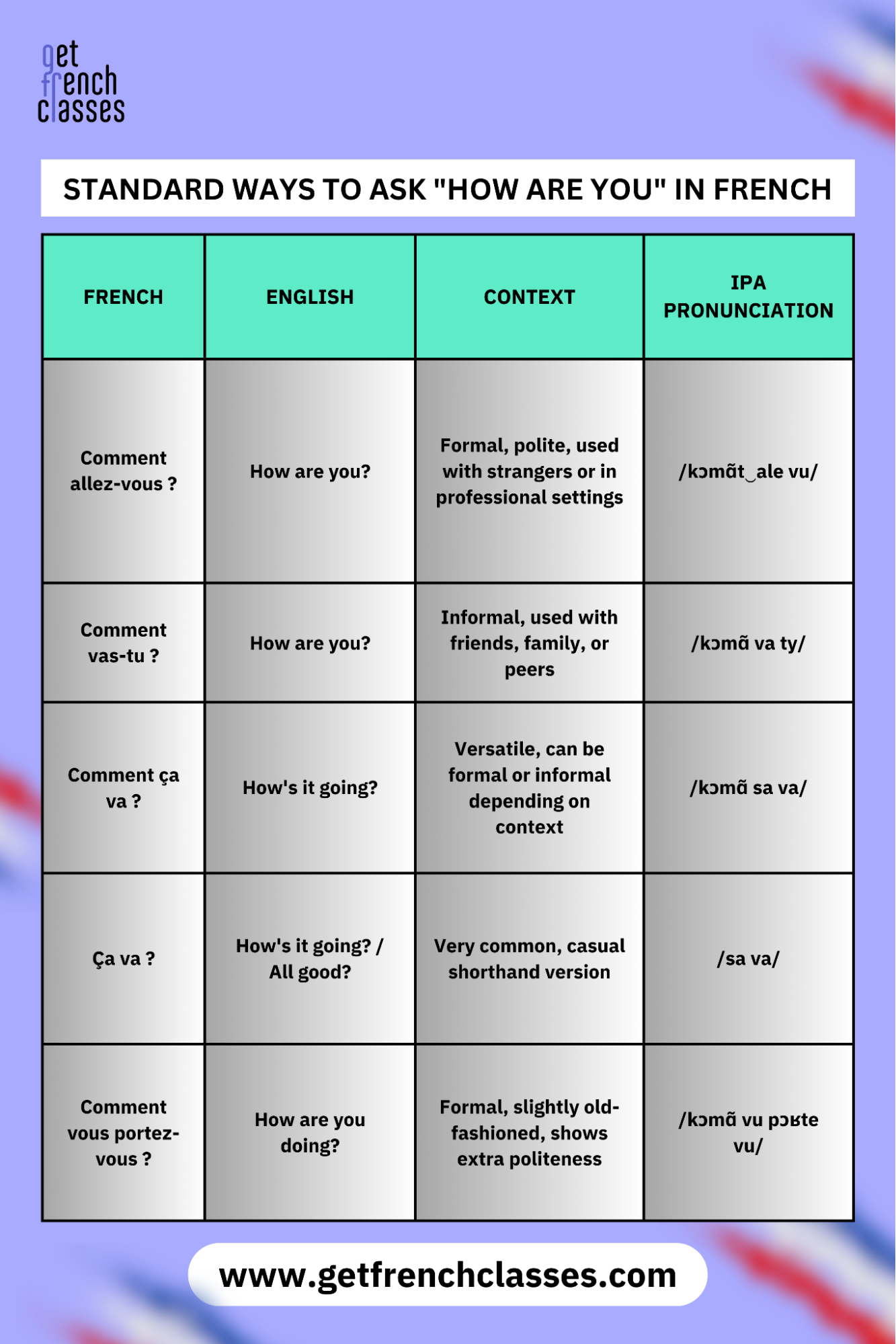

These are your bread-and-butter phrases. Master these, and you'll never be caught tongue-tied when greeting someone in French language.
| French | English | Context | IPA Pronunciation |
|---|---|---|---|
| Comment allez-vous ? | How are you? | Formal, polite, used with strangers or in professional settings | /kɔmɑ̃t‿ale vu/ |
| Comment vas-tu ? | How are you? | Informal way, used with friends, family, or peers | /kɔmɑ̃ va ty/ |
| Comment ça va ? | How's it going? | Versatile, can be formal or informal depending on context | /kɔmɑ̃ sa va/ |
| Ça va ? | How's it going? / All good? | (literal translation) Very common, casual shorthand version | /sa va/ |
| Comment vous portez-vous ? | How are you doing? | Formal, slightly old-fashioned, shows extra politeness | /kɔmɑ̃ vu pɔʁte vu/ |
Examples and explanations of nuances:
-
At a job interview: " Bonjour Madame, comment allez-vous ? " (literally translates, Hello Madam, how are you? ) Nuance : This formal version shows respect and professionalism. It's a safe bet in any formal situation.
-
Greeting a friend: " Salut Marie ! Comment vas-tu ? " ( Hi Marie! How are you? ) Nuance : The informal "tu" form is perfect for friends and peers. It's warm and friendly.
-
Casual check-in: " Alors, comment ça va aujourd'hui ? " ( So, how's it going today? ) Nuance : "Comment ça va" is versatile. The added "alors" (so) makes it sound more conversational.
-
Quick greeting: " Ça va ? " ( All good? ) Nuance : This super short version is great for quick check-ins. It's casual but widely used.
-
Formal event: " Bonsoir Monsieur, comment vous portez-vous ? " ( Good evening Sir, how are you doing? ) Nuance : This old-school formal version shows extra politeness, great for impressing at formal events.
Casual and informal ways to ask "how are you" in French
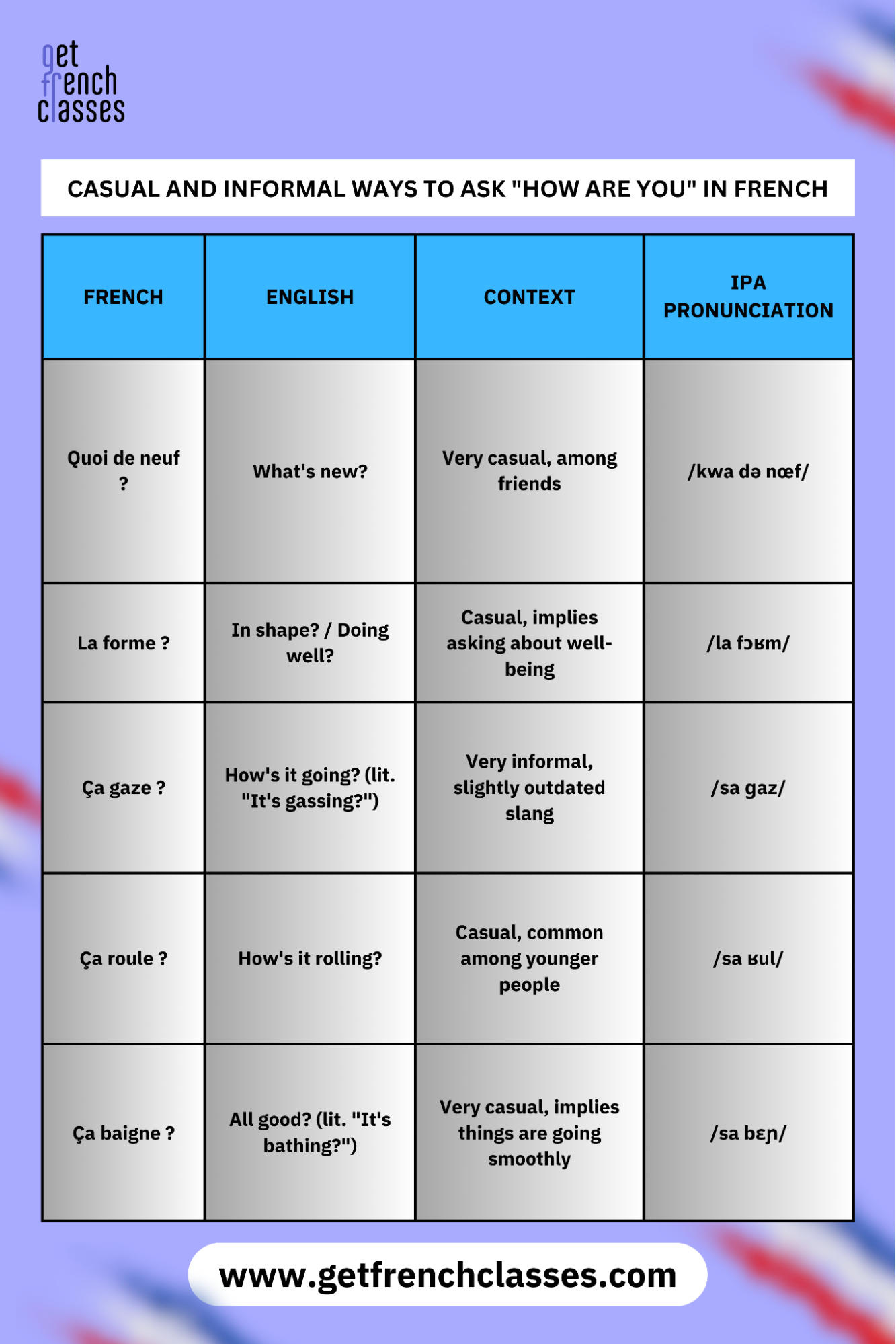

Want to sound more like a local? Try these casual goodnights. They're perfect for friends, family, or anytime you want to keep things relaxed.
| French | English | Context | IPA Pronunciation |
|---|---|---|---|
| Quoi de neuf ? | What's new? | (This expression literally means WHAT'S UP?) Very casual, among friends | /kwa də nœf/ |
| La forme ? | In shape? / Doing well? | Casual, implies asking about well-being | /la fɔʁm/ |
| Ça gaze ? | How's it going? (lit. "It's gassing?") | Very informal, slightly outdated slang | /sa ɡaz/ |
| Ça roule ? | How's it rolling? | Casual, common among younger people | /sa ʁul/ |
| Ça baigne ? | All good? (lit. "It's bathing?") | Very casual, implies things are going smoothly | /sa bɛɲ/ |
Examples and explanations of nuances:
-
Bumping into a friend: " Hey Sam ! Quoi de neuf ? " ( Hey Sam! What's new? ) Nuance : This is super casual and shows you're interested in what's been happening in their life.
-
Checking on a friend after they've been sick: " Alors, la forme ? " ( So, feeling better? / Back in shape? ) Nuance : "La forme" specifically asks about someone's physical or mental well-being. It's caring but casual.
-
Greeting a colleague you're friendly with: " Salut Pierre, ça gaze ? " ( Hi Pierre, how's it going? ) Nuance : "Ça gaze" is quite informal. It's a bit old-school cool, like saying "What's cooking?" in English.
-
Meeting up with your bestie: " Coucou ! Ça roule ? " ( Hey there! How's it rolling? ) Nuance : "Ça roule" is youthful and dynamic. It implies you expect things are going well.
-
Casual check-in text: "Ça baigne ?" (Everything smooth? / All good?) Nuance : "Ça baigne" literally means "It's bathing," implying things are going smoothly. It's very laid-back.
Remember, these casual phrases are great with friends, but stick to the standard ones for anyone you're not close with.
The French take their social etiquette seriously, so it's better to err on the side of politeness if you're unsure. But with your pals? Go wild with these fun expressions!
Formal and polite "how are you" expressions in French
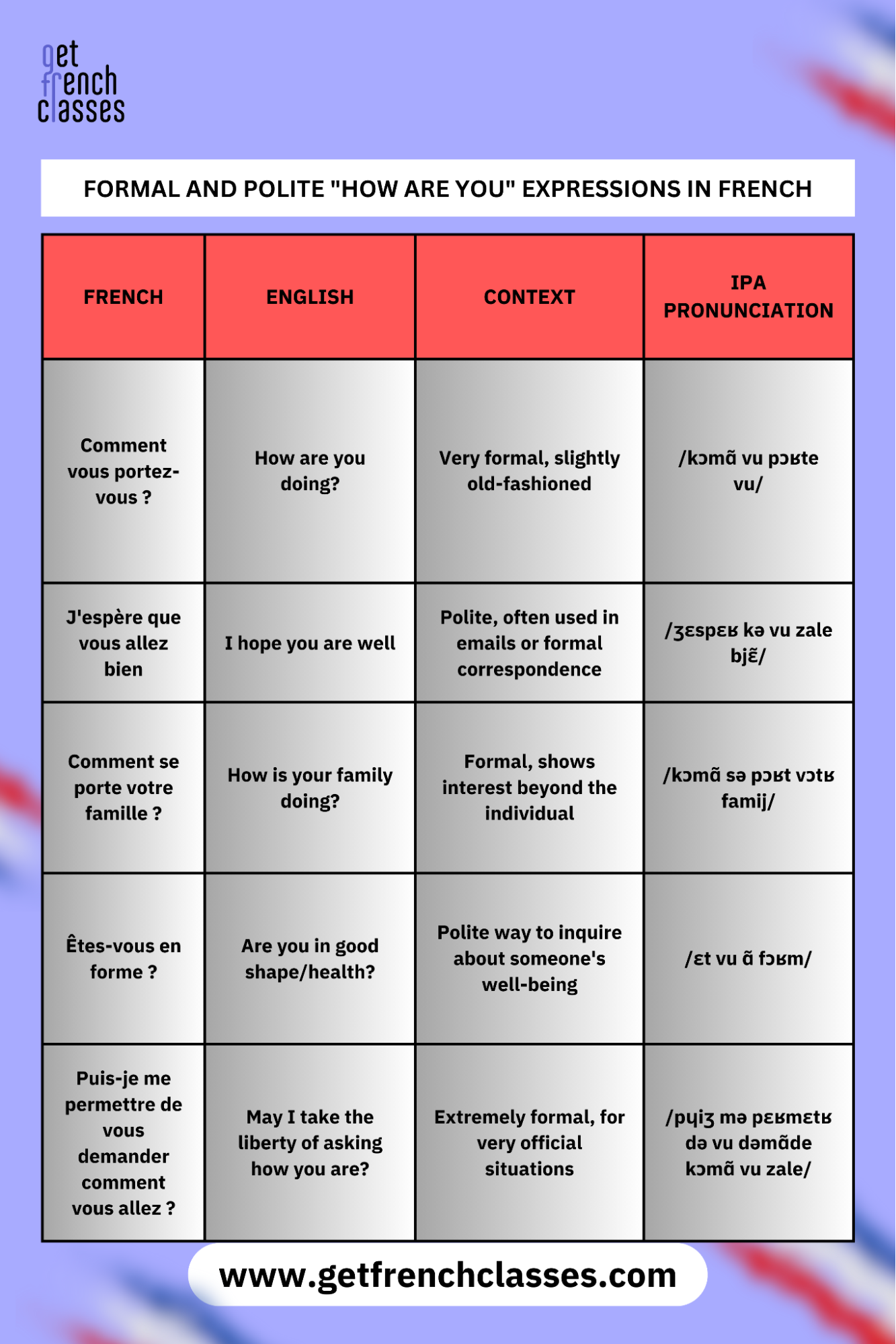
Time to class things up! These formal and polite expressions are perfect for impressing your boss, chatting with your elderly neighbor, or any situation where you need to show some extra respect. Let's dive in!
| French | English | Context | IPA Pronunciation |
|---|---|---|---|
| Comment vous portez-vous ? | How are you doing? | Very formal, slightly old-fashioned | /kɔmɑ̃ vu pɔʁte vu/ |
| J'espère que vous allez bien | I hope you are well | Polite, often used in emails or formal correspondence | /ʒɛspɛʁ kə vu zale bjɛ̃/ |
| Comment se porte votre famille ? | How is your family doing? | Formal, shows interest beyond the individual | /kɔmɑ̃ sə pɔʁt vɔtʁ famij/ |
| Êtes-vous en forme ? | Are you in good shape/health? | Polite way to inquire about someone's well-being | /ɛt vu ɑ̃ fɔʁm/ |
| Puis-je me permettre de vous demander comment vous allez ? | May I take the liberty of asking how you are? | Extremely formal, for very official situations | /pɥiʒ mə pɛʁmɛtʁ də vu dəmɑ̃de kɔmɑ̃ vu zale/ |
Examples and explanations of nuances:
-
At a formal business meeting: " Bonjour Monsieur Dupont, comment vous portez-vous aujourd'hui ? " ( Hello Mr. Dupont, how are you doing today? ) Nuance : This old-school formal version shows respect and sophistication. It's like the linguistic equivalent of a well-tailored suit.
-
Starting a formal email: " Chère Madame, j'espère que vous allez bien. " ( Dear Madam, I hope you are well. ) Nuance : This is a polite way to open formal correspondence. It shows consideration without being too personal.
-
At a family friend's wedding: " Bonsoir Madame Martin, comment se porte votre famille ? " ( Good evening Mrs. Martin, how is your family doing? ) Nuance : This shows you care not just about the individual, but their loved ones too. It's thoughtful and very French!
Asking "how are you" in French slang
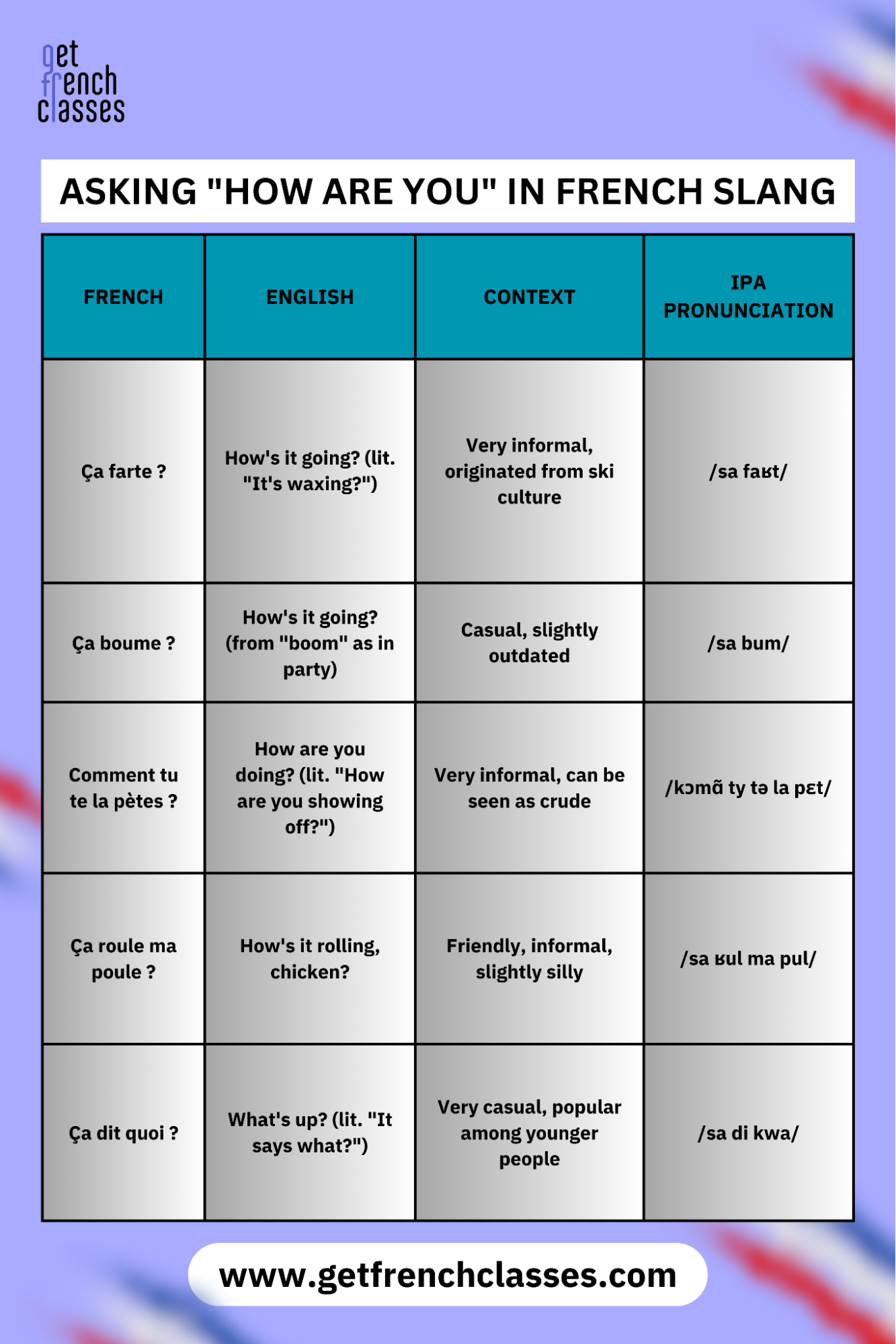
Ready to sound like you've been hanging out on the streets of Paris? These slang expressions will have you fitting right in with the cool crowd. Just remember, use with caution – your French teacher might not approve!
| French | English | Context | IPA Pronunciation |
|---|---|---|---|
| Ça farte ? | How's it going? (lit. "It's waxing?") | Very informal, originated from ski culture | /sa faʁt/ |
| Ça boume ? | How's it going? (from "boom" as in party) | Casual, slightly outdated | /sa bum/ |
| Comment tu te la pètes ? | How are you doing? (lit. "How are you showing off?") | Very informal, can be seen as crude | /kɔmɑ̃ ty tə la pɛt/ |
| Ça roule ma poule ? | How's it rolling, chicken? | Friendly, informal, slightly silly | /sa ʁul ma pul/ |
| Ça dit quoi ? | What's up? (lit. "It says what?") | Very casual, popular among younger people | /sa di kwa/ |
Examples and explanations of nuances:
-
Meeting a friend at a ski resort: " Yo mec, ça farte ? " ( Hey dude, how's it going? ) Nuance : "Ça farte" comes from ski culture (farter = to wax skis). It's super casual and a bit playful.
-
Greeting a buddy at a party: " Salut mon pote, ça boume ? " ( Hi buddy, how's it going? ) Nuance : "Ça boume" is old-school slang. Using it might make you sound either outdated or ironically retro-cool.
-
Texting a close friend: " Ça dit quoi ? " ( What's up? ) Nuance This is very current slang. It's like asking "What's the word?" in English.
Gen Z ways to ask "how are you" in French
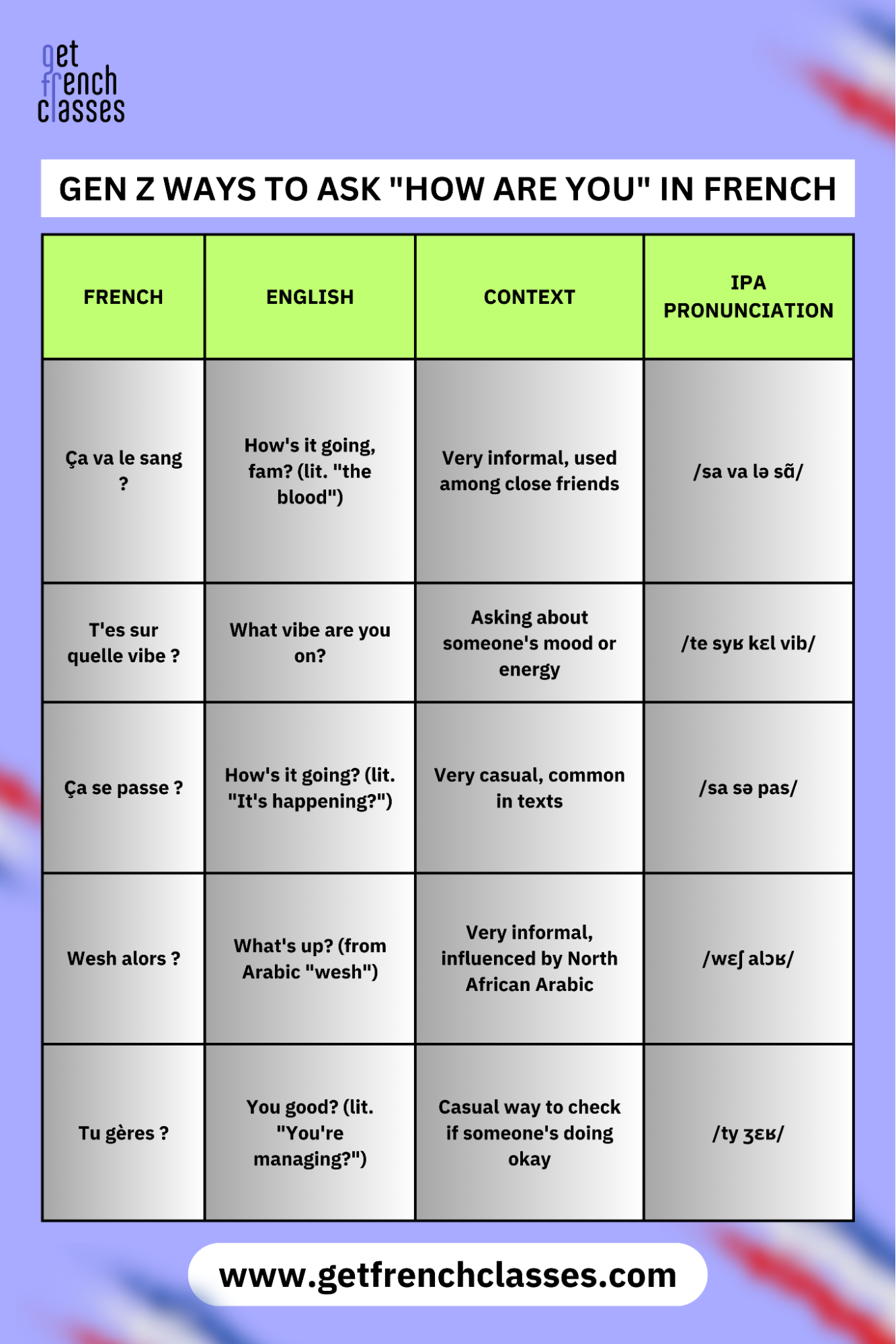
These ultra-modern expressions will have you sounding like a true French teen. Just don't be surprised if your French grandma doesn't understand a word you're saying!
| French | English | Context | IPA Pronunciation |
|---|---|---|---|
| Ça va le sang ? | How's it going, fam? (lit. "the blood") | Very informal, used among close friends | /sa va lə sɑ̃/ |
| T'es sur quelle vibe ? | What vibe are you on? | Asking about someone's mood or energy | /te syʁ kɛl vib/ |
| Ça se passe ? | How's it going? (lit. "It's happening?") | Very casual, common in texts | /sa sə pas/ |
| Wesh alors ? | What's up? (from Arabic "wesh") | Very informal, influenced by North African Arabic | /wɛʃ alɔʁ/ |
| Tu gères ? | You good? (lit. "You're managing?") | Casual way to check if someone's doing okay | /ty ʒɛʁ/ |
Examples and explanations of nuances:
-
Greeting your bestie: " Yo, ça va le sang ? " ( Hey, how's it going, fam? ) Nuance : "Le sang" (literally "the blood") is like saying "fam" or "blood" in English slang. It's very casual and shows close friendship.
-
Checking in on a friend's mood: " Alors, t'es sur quelle vibe aujourd'hui ? " ( So, what vibe are you on today? ) Nuance : This is very Gen Z. It's asking about someone's mood or energy in a hip way.
-
Quick text to a friend: " Wesh alors, tu gères ? " ( What's up, you good? ) Nuance : "Wesh" comes from North African Arabic and is super casual. "Tu gères" is like asking if someone's handling things okay.
Remember, while these expressions are fun, they're also very informal. Stick to using them with your peers and close friends. And hey, using some of these might even earn you some cool points with your French Gen Z pals.
Regional variations of "how are you" in French-speaking countries
From the cafes of Quebec to the streets of Senegal, let's explore how francophones check in on each other.
| Region | French expression | English Translation | Context | IPA Pronunciation |
|---|---|---|---|---|
| Quebec, Canada | Comment ça va, toé ? | How's it going, you? | Casual Quebecois greeting | /kɔmɑ̃ sa va, twe/ |
| Belgium | À va, savez-vous ? | It's going well, you know? | Common in Belgian French | /a va, save vu/ |
| Switzerland | Quoi de beau ? | What's beautiful? | Swiss French way of asking what's new | /kwa də bo/ |
| Côte d'Ivoire | On est comment ? | How are we? | Common West African French greeting | /ɔ̃ ɛ kɔmɑ̃/ |
| Louisiana, USA | Comment ça roule, cher ? | How's it rolling, dear? | Cajun French variant | /kɔmɑ̃ sa rul, ʃɛʁ/ |
Examples and explanations of nuances:
-
In a Montreal cafe: " Salut mon ami, comment ça va, toé ? " ( Hi my friend, how's it going, you? ) Nuance : The "toé" instead of "toi" is very Quebecois. It adds a friendly, local flavor to the greeting.
-
On a Brussels street: " Bonjour ! À va, savez-vous ? " ( Hello! It's going well, you know? ) Nuance : This Belgian expression is both a greeting and a statement. It's like saying "I'm good, and I assume you are too!"
-
In a Dakar market: " Eh, mon frère ! On est comment ? " ( Hey, my brother! How are we? ) Nuance : This West African greeting uses "we" instead of "you," reflecting a more collective cultural mindset.
Creative and unique ways to ask "how are you" in French
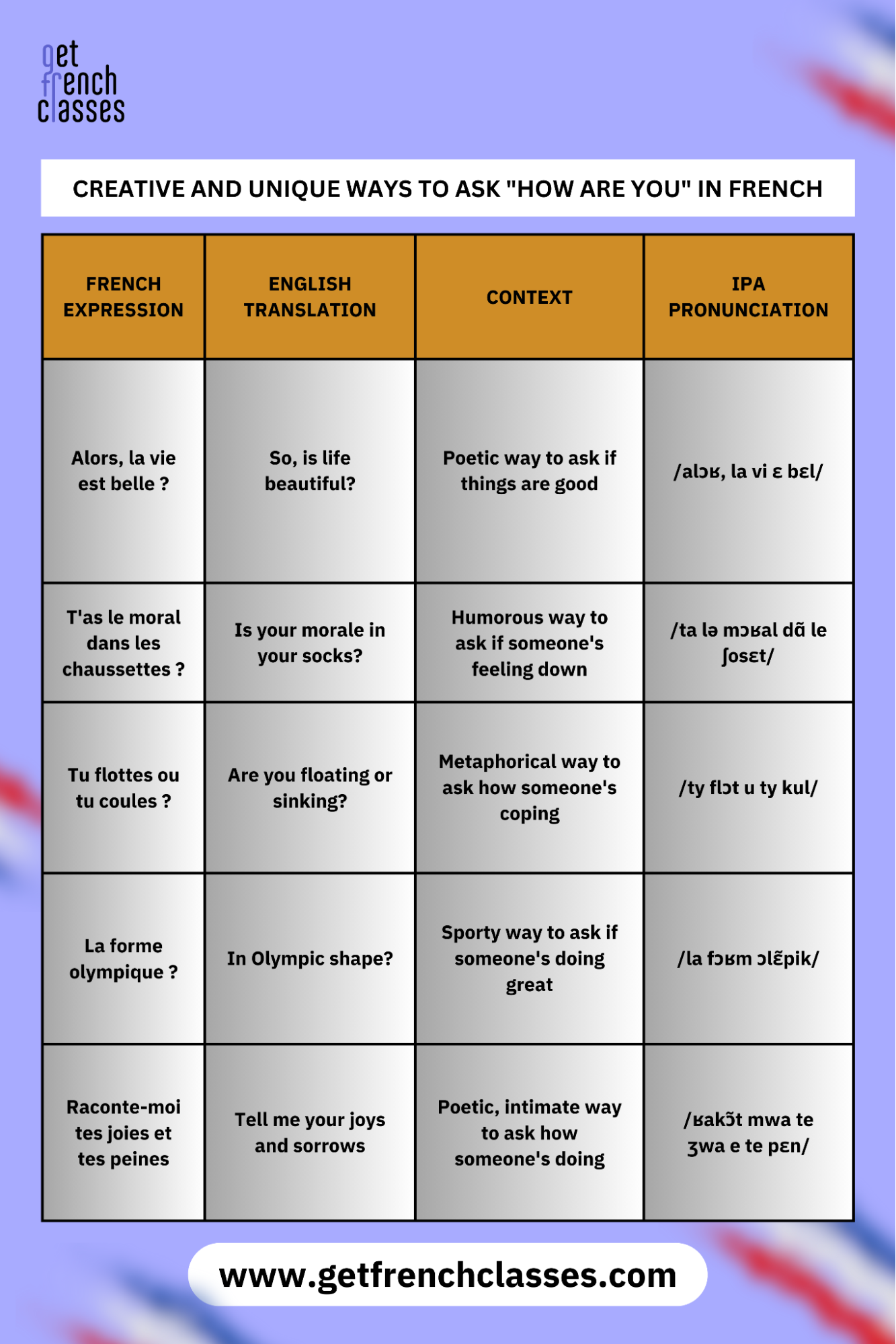
Feeling adventurous? These creative expressions will add some serious flair to your French greetings. They're perfect for when you want to surprise your French-speaking friends or just have some linguistic fun!
| French expression | English Translation | Context | IPA Pronunciation |
|---|---|---|---|
| Alors, la vie est belle ? | So, is life beautiful? | Poetic way to ask if things are good | /alɔʁ, la vi ɛ bɛl/ |
| T'as le moral dans les chaussettes ? | Is your morale in your socks? | Humorous way to ask if someone's feeling down | /ta lə mɔʁal dɑ̃ le ʃosɛt/ |
| Tu flottes ou tu coules ? | Are you floating or sinking? | Metaphorical way to ask how someone's coping | /ty flɔt u ty kul/ |
| La forme olympique ? | In Olympic shape? | Sporty way to ask if someone's doing great | /la fɔʁm ɔlɛ̃pik/ |
| Raconte-moi tes joies et tes peines | Tell me your joys and sorrows | Poetic, intimate way to ask how someone's doing | /ʁakɔ̃t mwa te ʒwa e te pɛn/ |
Examples and explanations of nuances:
-
On a sunny day: " Salut Marie ! Alors, la vie est belle ? " ( Hi Marie! So, is life beautiful? ) Nuance : This poetic greeting assumes things are good, especially on a nice day. It's upbeat and a bit romantic.
-
Checking on a friend who seems down: " Eh, Paul, t'as le moral dans les chaussettes ? " ( Hey, Paul, is your morale in your socks? ) Nuance : This humorous expression is a gentle way to ask if someone's feeling low. It's caring but keeps things light.
-
After a challenging period: " Coucou ! Tu flottes ou tu coules ? " ( Hey there! Are you floating or sinking? ) Nuance : This metaphorical question asks how someone's coping. It acknowledges life can be tough without being too heavy.
How to answer "how are you" in French?
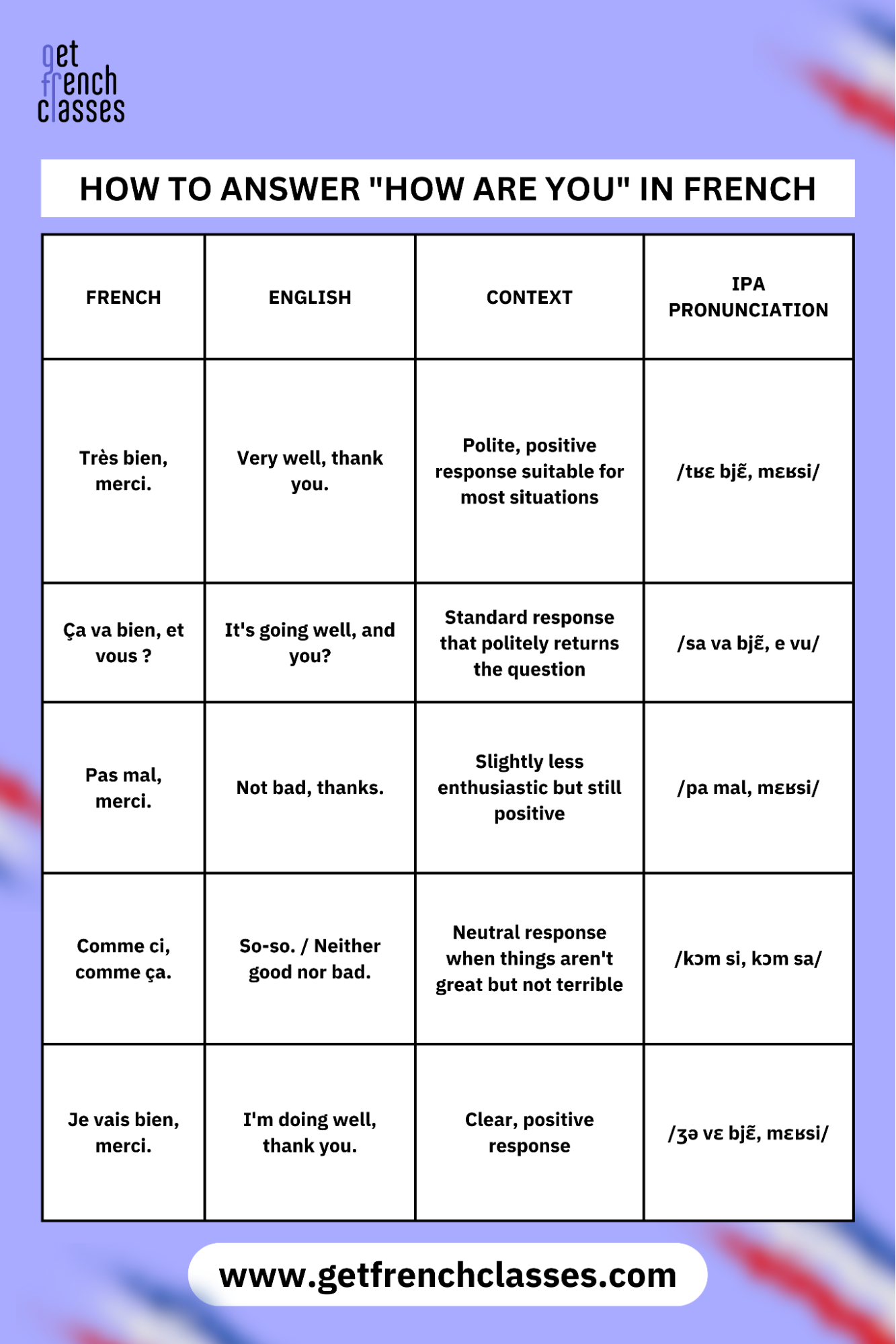
Alright, you've mastered asking "How are you?" in French, but what happens when someone turns the tables and asks you? Don't panic! We've got you covered with a range of responses from politely positive to casually cool. Let's dive in!
Standard responses to "how are you" in French
These are your go-to responses for everyday situations. They're safe, polite, and perfect for most encounters, whether you're chatting with your neighbor or meeting your partner's parents for the first time.
| New Column 1 | English | Context | IPA Pronunciation |
|---|---|---|---|
| French | English | Context | IPA Pronunciation |
| Très bien, merci. | Very well, thank you. | Polite, positive response suitable for most situations | /tʁɛ bjɛ̃, mɛʁsi/ |
| Ça va bien, et vous ? | It's going well, and you? | Standard response that politely returns the question | /sa va bjɛ̃, e vu/ |
| Pas mal, merci. | Not bad, thanks. | Slightly less enthusiastic but still positive | /pa mal, mɛʁsi/ |
| Comme ci, comme ça. | So-so. / Neither good nor bad. | Neutral response when things aren't great but not terrible | /kɔm si, kɔm sa/ |
| Je vais bien, merci. | I'm doing well, thank you. | Clear, positive response | /ʒə vɛ bjɛ̃, mɛʁsi/ |
Examples and explanations of nuances:
-
At a job interview: Interviewer : " Comment allez-vous ? " You : " Très bien, merci. Je suis ravi(e) d'être ici. " ( Very well, thank you. I'm delighted to be here. ) Nuance : This response is positive and enthusiastic, perfect for making a good first impression in a formal setting.
-
Meeting your partner's parents: Parent : " Comment allez-vous ? " You : " Je vais bien, merci. Et vous, comment allez-vous ? " ( I'm doing well, thank you. And you, how are you? ) Nuance : This response is polite and shows consideration by returning the question. It's a safe choice for meeting new people in a slightly formal context.
-
Responding to a colleague: Colleague : " Ça va ? " You : " Pas mal, merci. Un peu fatigué(e), mais ça va. " ( Not bad, thanks. A bit tired, but it's okay. ) Nuance : This response is honest without being negative. It's appropriate for workplace small talk, showing you're doing okay but not overly enthusiastic.
Casual and informal responses in French
These casual responses are perfect for chatting with friends, classmates, or anyone you're on familiar terms with. Just remember, context is key – save these for relaxed situations!
| French | English | Column A | IPA Pronunciation |
|---|---|---|---|
| Ça roule ! | It's rolling! / All good! | Very casual, upbeat response | /sa ʁul/ |
| Tranquille ! | Chilling! / Relaxed! | Laid-back response, popular among younger people | /tʁɑ̃kil/ |
| Nickel ! | Perfect! / Great! | Enthusiastic, casual response | /nikɛl/ |
| Bof, ça pourrait aller mieux. | Meh, could be better. | Honest response when things aren't great | /bɔf, sa puʁɛ ale mjø/ |
| La forme ! | In great shape! | Upbeat, slightly boastful response | /la fɔʁm/ |
Examples and explanations of nuances:
-
Meeting friends at a café: Friend : " Salut ! Ça va ? " You : " Ça roule ! On se fait un café ? " ( All good! Shall we grab a coffee? ) Nuance : "Ça roule" is very casual and upbeat. It suggests you're doing well and ready for social interaction.
-
Texting a classmate: Classmate : " Hey, la forme ? " You : " Tranquille ! Et toi ? " ( Chilling! And you? ) Nuance : "Tranquille" literally means "quiet" but here it means you're relaxed and everything's cool. It's very popular among younger French speakers.
-
When you're not feeling great: Friend : "Comment ça va aujourd'hui ?" You : "Bof, ça pourrait aller mieux. J'ai pas bien dormi." ( Meh, could be better. I didn't sleep well. ) Nuance : "Bof" is a casual way to express disappointment or lack of enthusiasm. It's honest without being too negative.
Remember, in French culture, it's okay to be honest about how you're feeling, but it's generally best to keep things positive in casual encounters. If you're not feeling great, you can always go with a simple " Ça va " ( It's going ) – it's neutral enough to be honest without bringing down the mood.
Also, don't forget to return the question! In French, it's considered polite to ask " Et toi ? " ( And you? ) or " Et vous ? " ( And you? - formal) after responding. It shows you're interested in the other person and keeps the conversation flowing.
Formal and polite responses in French
These responses are perfect for impressing your boss, chatting with your elderly neighbor, or any situation where you need to show respect and refinement.
| French | English | Context | IPA Pronunciation |
|---|---|---|---|
| Je me porte très bien, je vous remercie. | I'm doing very well, thank you. | Very formal, shows refinement | /ʒə mə pɔʁt tʁɛ bjɛ̃, ʒə vu ʁəmɛʁsi/ |
| Fort bien, je vous suis reconnaissant(e) de votre sollicitude. | Very well, I'm grateful for your concern. | Extremely formal, slightly old-fashioned | /fɔʁ bjɛ̃, ʒə vu sɥi ʁəkɔnɛsɑ̃ də vɔtʁ sɔlisityd/ |
| Excellemment bien, et j'espère qu'il en va de même pour vous. | Excellently well, and I hope the same for you. | Formal and enthusiastic | /ɛksɛlɑmɑ̃ bjɛ̃, e ʒɛspɛʁ kil ɑ̃ va də mɛm puʁ vu/ |
| Je vais parfaitement bien, je vous en remercie. | I'm perfectly well, thank you. | Polite and positive | /ʒə vɛ paʁfɛtmɑ̃ bjɛ̃, ʒə vuz‿ɑ̃ ʁəmɛʁsi/ |
| Tout va pour le mieux, merci de vous en enquérir. | Everything is going for the best, thank you for asking. | Formal and slightly philosophical | /tu va puʁ lə mjø, mɛʁsi də vuz‿ɑ̃n‿ɑ̃keʁiʁ/ |
Examples and explanations of nuances:
-
At a job interview: Interviewer : " Comment allez-vous aujourd'hui ? " You : " Je me porte très bien, je vous remercie. Je suis ravi(e) d'être ici. " ( I'm doing very well, thank you. I'm delighted to be here. ) Nuance : This response shows refinement and enthusiasm, perfect for making a great first impression in a formal setting.
-
Meeting a distinguished elderly person: Elderly person : " Comment vous portez-vous, jeune homme/femme ? " You : " Fort bien, je vous suis reconnaissant(e) de votre sollicitude. J'espère que vous allez bien également. " ( Very well, I'm grateful for your concern. I hope you're doing well too. ) Nuance : This slightly old-fashioned response shows great respect and appreciation for the other person's concern.
Responding in French slang
These slang responses will have you fitting right in with the cool crowd. Just remember, use with caution – your French teacher might raise an eyebrow!
| French | English | Context | IPA Pronunciation |
|---|---|---|---|
| Ça baigne ! | It's all good! (lit. "It's bathing!") | Very casual, positive response | /sa bɛɲ/ |
| Impec ! | Perfect! (short for "impeccable") | Casual, enthusiastic response | /ɛ̃pɛk/ |
| Ça gaze, mon pote ! | It's going great, buddy! (lit. "It's gassing!") | Used in very informal contexts, friendly | /sa ɡaz, mɔ̃ pɔt/ |
| Tranquille, la vie est belle ! | Chilling, life is beautiful! | Laid-back, positive response | /tʁɑ̃kil, la vi ɛ bɛl/ |
| Ça roule, ma poule ! | It's rolling, chicken! (rhyming slang) | Very casual, slightly silly | /sa ʁul, ma pul/ |
Examples and explanations of nuances:
-
Meeting friends at a party: Friend : " Yo, ça va ? " You : " Ça baigne ! La soirée s'annonce bien ! " ( It's all good! The evening's looking great! ) Nuance : "Ça baigne" is very casual and upbeat. It suggests everything's going smoothly.
-
Responding to a close buddy: Friend : "Comment tu te sens, mec ?" You : "Impec ! Prêt à faire la fête !" ( Perfect! Ready to party! )
Nuance : "Impec" is a shortened version of "impeccable". It's enthusiastic and very casual.
Gen Z responses to "how are you" in French
These ultra-modern expressions will have you sounding like a true French teen. Just don't be surprised if your French grandma gives you a confused look!
| French | English | Context | IPA Pronunciation |
|---|---|---|---|
| Ça farte ! | It's great! (from ski waxing) | Very informal, positive | /sa faʁt/ |
| J'suis en PLS, mais ça va. | I'm wrecked, but it's okay. (PLS = recovery position) | Exaggerated way to say you're tired | /ʒsɥi ɑ̃ pe ɛl ɛs, mɛ sa va/ |
| Trop bien, c'est le feu ! | Super good, it's lit! (lit. "it's fire") | Very enthusiastic, youthful response | /tʁo bjɛ̃, sɛ lə fø/ |
| On est là ! | We're here! (meaning "I'm good") | Casual affirmation of presence and well-being | /ɔ̃ ɛ la/ |
| La zone, frère ! | In the zone, bro! | Very casual, indicates you're doing great | /la zɔn, fʁɛʁ/ |
Examples and explanations of nuances:
-
Responding to a friend's text: Friend : " Wesh, tu gères ? " You : " Ça farte ! On se capte plus tard ? " ( It's great! Catch you later? ) Nuance : "Ça farte" comes from ski culture but is now used generally to mean things are going well. It's very trendy among young people.
-
After a long night out: Friend : " T'es en forme ? " You : " J'suis en PLS, mais ça va. Faut que je me réveille ! " ( I'm wrecked, but it's okay. Need to wake up! ) Nuance : "PLS" stands for "Position Latérale de Sécurité" (recovery position), but it's used humorously to say you're extremely tired or overwhelmed.
Remember, while these expressions are fun and trendy, they're also very informal. Stick to using them with your peers and close friends.
The culture of asking and answering "how are you" in France
In France, " Comment allez-vous? " or " Ça va? " is more than just a casual greeting - it's an invitation to a brief but genuine exchange. Unlike in some English-speaking countries where " How are you? " often expects a quick " Fine, thanks " in response, the French generally anticipate a real, albeit concise, answer.
When asked this question, it's customary to provide a short but honest response about your state, followed by returning the question with "Et vous?" or "Et toi?" Failing to ask back can be perceived as impolite or self-centered.
The level of detail in your response should be tailored to the context and your relationship with the person asking.
-
With close friends or family, you can be more open about your feelings or circumstances.
-
In professional or formal situations, it's best to keep your answer positive and brief, unless specifically asked for more details.
The French appreciate honesty, so if you're not feeling great, it's acceptable to say so, but avoid oversharing with acquaintances or in professional settings. This balance reflects the French value of authentic communication while respecting social boundaries.
Importantly, this exchange is often accompanied by appropriate physical greetings, which vary based on the relationship and context. These may include la bise (cheek kisses) among friends, a handshake in professional settings, or simply maintaining eye contact during the conversation.
This combination of verbal and non-verbal communication in the "How are you?" ritual embodies core French cultural values: an appreciation for meaningful or casual conversation, an emphasis on politeness, and the importance of personal connections, even in brief social interactions.
Beyond "how are you": French phrases for checking in and showing care
Sometimes, a simple "Ça va?" just doesn't cut it. When you want to show you really care, or you're concerned about someone, these phrases will help you dig a little deeper. Let's explore some heartfelt ways to check in on your French-speaking friends and loved ones!
| French Phrase | English Translation | Context | IPA Pronunciation |
|---|---|---|---|
| Comment te sens-tu vraiment ? | How are you really feeling? | For deeper conversations with close friends | /kɔmɑ̃ tə sɑ̃ ty vʁɛmɑ̃/ |
| Tout va bien ? Tu as l'air préoccupé(e). | Is everything okay? You look preoccupied. | When you notice someone seems worried | /tu va bjɛ̃ ? ty a lɛʁ pʁeɔkype/ |
| Tu tiens le coup ? | Are you hanging in there? | For someone going through a tough time | /ty tjɛ̃ lə ku/ |
| Qu'est-ce qui te tracasse ? | What's bothering you? | When you sense something's wrong | /kɛs ki tə tʁakas/ |
| Je suis là si tu as besoin d'en parler. | I'm here if you need to talk about it. | Offering support to someone | /ʒə sɥi la si ty a bəzwɛ̃ dɑ̃ paʁle/ |
| J'espère que tu vas bien. | I hope you're doing well | To check in with someone or express care | /ʒɛspɛʁ kə ty va bjɛ̃/ |
Examples and explanations of nuances:
-
Checking in on a friend who's been quiet lately:
You : " Salut Marie, comment te sens-tu vraiment ? Ça fait un moment qu'on n'a pas discuté. " ( Hi Marie, how are you really feeling? It's been a while since we've talked. ) Nuance : Adding "vraiment" (really) encourages a more honest, in-depth response. It shows you're ready for a real conversation, not just small talk.
2. Noticing a colleague looks stressed:
You : " Thomas, tout va bien ? Tu as l'air préoccupé. Je peux t'aider avec quelque chose ? " ( Thomas, is everything okay? You look preoccupied. Can I help you with something? ) Nuance : This phrase acknowledges what you've observed about their state and offers help, showing genuine concern.
3. Supporting a friend through a breakup: You : " Ma chérie, tu tiens le coup ? N'hésite pas si tu as besoin de quoi que ce soit. " ( My dear, are you hanging in there? Don't hesitate if you need anything. ) Nuance : "Tu tiens le coup" is a compassionate way to ask if someone's managing during a difficult time. It acknowledges their struggle without pressuring them to be "okay".
4. When a friend seems troubled: You : " Qu'est-ce qui te tracasse ? Tu sais que tu peux tout me dire. " ( What's bothering you? You know you can tell me anything. ) Nuance : "Tracasser" implies a nagging worry. This phrase invites the person to open up about their concerns in a non-judgmental way.
5. Offering support to someone going through a hard time: You : " Je suis là si tu as besoin d'en parler. Jour ou nuit, n'hésite pas à m'appeler. " ( I'm here if you need to talk about it. Day or night, don't hesitate to call me. )
Nuance : This phrase offers unconditional support. Adding "Jour ou nuit" emphasizes your availability and willingness to listen anytime.
Remember, in French culture, while people appreciate directness, it's also important to be tactful. These phrases show you care without being overly intrusive. They open the door for a deeper conversation but still allow the other person to decide how much they want to share.
Also, non-verbal cues are crucial in these situations. A gentle tone of voice, maintaining eye contact, and open body language can speak volumes. In French culture, a light touch on the arm or a comforting hand on the shoulder (if you know the person well) can also convey empathy.
Lastly, be prepared to listen. In France, if you ask these deeper questions, it's expected that you're ready to engage in a meaningful conversation. It's not just polite small talk – you're signaling that you're there to support and understand.
How to ask and answer "how are you" in French FAQ
What's the difference between "Comment allez-vous" and "Comment vas-tu"?
Great question! Here's the scoop: "Comment allez-vous" is the formal version, using "vous" (formal "you").
You'd use this with people you don't know well, in professional settings, or with older people to show respect. "Comment vas-tu" is the informal version, using "tu" (informal "you"). This is for friends, family, peers, or in casual settings.
Think of it like "How are you doing, sir/madam?" vs. "How're you doing, buddy?" The meaning is the same, but the level of formality is different. In French, this distinction is crucial for proper etiquette.
How do I choose between formal and informal "How are you" in French?
Ah, the eternal formal vs. informal dilemma! Here's a quick guide: Use formal ("vous") with:
-
People you don't know well
-
Anyone older than you (unless they say otherwise)
-
Your boss, clients, or in professional settings
Use informal ("tu") with:
-
Friends and peers
-
Family members
-
Children
-
When someone tells you "On peut se tutoyer" (We can use "tu")
Remember, it's always safer to start formal. If the other person switches to "tu," you can follow suit. When in doubt, stick with "vous" – it's better to be overly polite than accidentally disrespectful!
Are French people always honest when answering "How are you"?
Well, honesty in France isn't quite the same as brutal honesty!
Here's the deal: French people tend to be more genuine in their responses compared to, say, the American "I'm fine, thanks" autopilot.
They might actually tell you if they're having a rough day. However, there's a balance:
-
With close friends : Pretty honest, might share details about their mood or recent experiences.
-
In professional settings : Generally positive but brief. "Ça va bien, merci" (It's going well, thanks) is common, even if they're not having the best day.
-
With acquaintances : A middle ground. They might hint at troubles without going into detail: "Ça pourrait aller mieux, mais ça va" (It could be better, but it's okay). Or other expressions like "Ça pourrait être pire, mais ça va." (It could be worse, but it's okay).
The key is context. French culture values authenticity, but also discretion. They're unlikely to unload all their problems on a stranger, but don't expect a fake "Everything's perfect!" either.
How can I make my "How are you" in French sound more natural?
Want to sound like a true Français? Try these tips:
-
Use filler words : Add "Alors" or "Eh bien" before your question. "Alors, comment ça va?"
-
Casual contractions : In informal situations, "Comment ça va?" often becomes "Ça va?"
-
Intonation matters : Rise slightly at the end of the question. It sounds more engaging.
-
Follow up : After they answer, a quick "Ah bon?" or "D'accord" shows you're listening.
-
Body language : A slight head tilt or raised eyebrows when asking can make it more natural.
-
Regional flavor : In the South, "Ça va?" might become "Ça va, petit?" Even if you don't use it, recognizing it helps.
Remember, sounding natural comes with practice. Don't be afraid to mimic native speakers – it's the best way to nail those subtle nuances!
Are there any French customs or etiquette related to asking "How are you"?
Absolutely! French "How are you" comes with its own set of unwritten rules:
-
Always return the question : After answering, say "Et vous?" (And you?) or "Et toi?" (informal). It's considered rude not to.
-
The greeting combo : "How are you" often comes after "Bonjour" or "Bonsoir." "Bonjour, comment allez-vous?" is a classic.
-
Physical greetings : Pre-COVID, a handshake (in formal settings) or "la bise" (cheek kisses, in casual settings) often accompanied the verbal greeting.
-
Eye contact : Maintaining eye contact during the exchange is important. It shows you're engaged.
-
Expect a real answer : Unlike in some cultures, French people often give (and expect) a brief but genuine response.
-
Time of day matters : "Comment allez-vous?" works anytime, but if you're specifically asking about someone's day, use "Bonne journée?" in the morning/afternoon, and "Bonne soirée?" in the evening.
